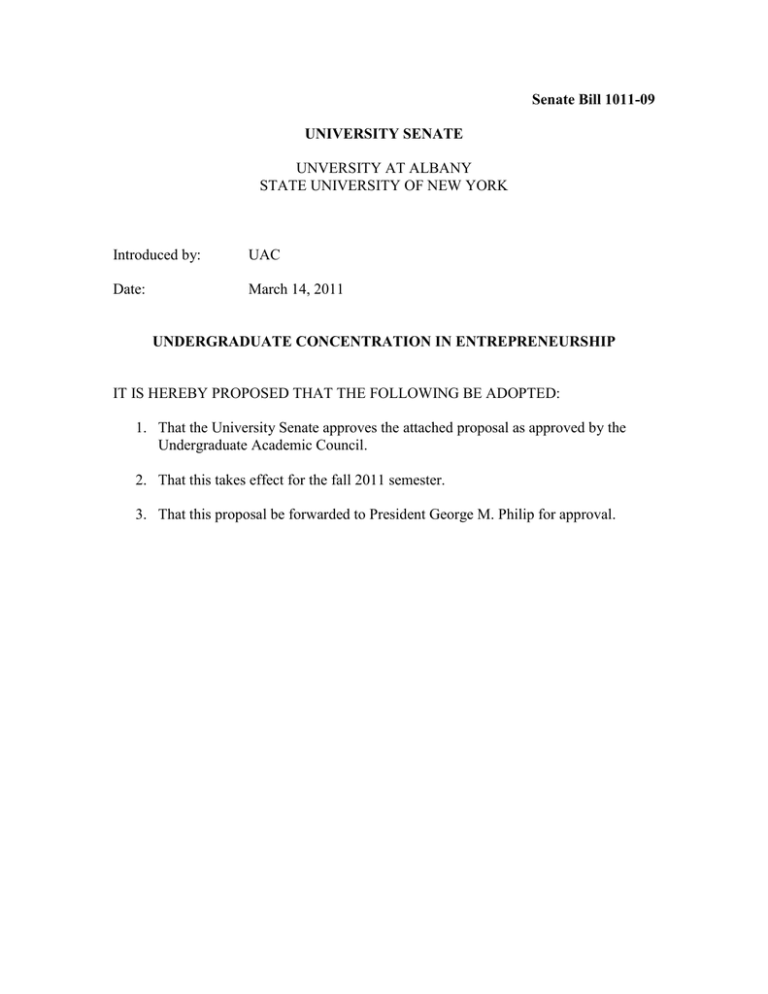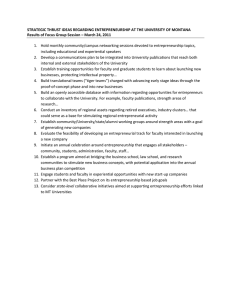
Senate Bill 1011-09
UNIVERSITY SENATE
UNVERSITY AT ALBANY
STATE UNIVERSITY OF NEW YORK
Introduced by:
UAC
Date:
March 14, 2011
UNDERGRADUATE CONCENTRATION IN ENTREPRENEURSHIP
IT IS HEREBY PROPOSED THAT THE FOLLOWING BE ADOPTED:
1. That the University Senate approves the attached proposal as approved by the
Undergraduate Academic Council.
2. That this takes effect for the fall 2011 semester.
3. That this proposal be forwarded to President George M. Philip for approval.
Proposal for an Undergraduate Concentration in Entrepreneurship
Revised February 7, 2011
In response to student demand and with strong faculty support, the School of Business
wishes to establish an undergraduate concentration in entrepreneurship. An attractive
feature of the concentration is that it is not “owned” by any single department, since it
includes courses in management, finance, marketing, and information technology
management. It is also important to note that the establishment of this concentration does
not require significantly large number of new faculty resources in terms of course
development. While one or two courses will be developed exclusively for this
concentration, many of the other courses will be adopted from existing courses taught in
the School of Business. If current enrollments are held constant, we envisage a net
increase of three to four course sections in any given year.
One new foundation course, Introduction to Entrepreneurship and Social Responsibility,
will be developed and taught by Dean Donald Siegel who is an active researcher in the
field of Entrepreneurship. We currently offer the proposed ITM, Marketing, and Finance
courses at the graduate level and will adapt these to our undergraduate audience. We
currently offer the proposed capstone Strategy course at the undergraduate level but
expect to offer a special section for this concentration that focus on issues relevant to
Entrepreneurship. Specifically, the revised course will be Strategic Entrepreneurship
(BMGT 482) and this course section will be devoted exclusively to students in the
entrepreneurship concentration and focused on content unique to that field.In the
remainder of this proposal, we provide a brief description of the salient characteristics of
the concentration along with five courses drawn (and/or developed) from various
departments that fulfill the requirements for students choosing the entrepreneurship
concentration.
Business Administration Major
Concentration: Entrepreneurship (15 Credits)
Each course in the Concentration is a 3 credit course.
Spring semester junior year
BBUS 400 (Prerequisite BFIN 300 and MKT 310)
Fall semester senior year
BFIN 404 (Prerequisite BFIN 300, BMKT 310, BBUS 400)
BMKT 440 (Prerequisites FIN 300, MKT 310, BUS 400)
Spring semester senior year
BITM 480 (Prerequisite BFIN 300, BMKT 310, BITM 330, BBUS
400)
BMGT 482 (Prerequisite BBUS 400, BFIN 404, BMKT 480)
Course Descriptions
BBUS 400 – Introduction to Entrepreneurship and Social Responsibility (3 credits,
spring semester)
This introductory course considers the antecedents and consequences of
entrepreneurship. The tools you develop in this course will help you understand how and
why a new venture is launched and how to make that effort successful. The class will
also provide you with exposure to basic entrepreneurial and business skills in a format
that encourages dialogue, develops critical thinking skills, and promotes self-awareness
and personal development. You will also learn about the impact of entrepreneurship on
the economy and society.
By the end of the course, you will be able to critically evaluate opportunities,
marshal resources, and understand how to manage a new venture. This is not a course
consisting solely of the “nuts and bolts” of how to start your own business. You will also
leave this course with a more thorough understanding of some of the key institutions
supporting entrepreneurship and specific government initiatives/programs to stimulate
entrepreneurial activity. You will also be knowledgeable about the salient issue of
technology commercialization at universities, federal labs, and firms, especially the
entrepreneurial dimensions of such activities.
A key component of this course is spirited, informed class discussion. The
quality of the course depends, to a large extent, on your input. If you are prepared to
challenge the instructor and your classmates, the class will be a rewarding and enriching
learning experience. To facilitate class discussion, short quizzes (in lieu of formal
exams) will be given each week on the reading assignments.
COURSE GOALS
(1) Offer a survey-level course that will examine entrepreneurship and liberal arts as
mutually reinforcing concepts
(2) Provide a basic understanding of entrepreneurship, the entrepreneurial process,
social responsibility, and basic business concepts
(3) Encourage entrepreneurship and active participation in new venture creation
(4) Understand the public policy aspects of entrepreneurship
(5) Facilitate access to resources at the university and off-campus that will enhance
the entrepreneurial learning experience
(6) Provide inspirational role models through guest speakers, articles, and case
studies
TEXTBOOK
Bruce R. Barringer and R. Duane Ireland (B&I) Entrepreneurship: Successfully
Launching
New Ventures. 2nd edition, Pearson Prentice Hall, 2006.
OTHER RECOMMENDED READINGS
Technological Entrepreneurship: Institutions and Agents Involved in University
Technology Transfer. (2006). Cheltenham, U.K.: Edward Elgar Publishing (Donald S.
Siegel, ed.)
The Oxford Handbook of Corporate Social Responsibility. (2008). Oxford, U.K.: Oxford
University Press. (Andrew Crane, Dirk Matten, Abagail McWilliams, Jeremy Moon, and
Donald S. Siegel, eds.).
Siegel, Donald S. and Philip Phan (2005). “Analyzing the Effectiveness of University
Technology Transfer: Implications for Entrepreneurship Education,” in Advances in the
Study of Entrepreneurship, Innovation, and Economic Growth, edited by Gary Liebcap,
Amsterdam: Elsevier Science/JAI Press, Vol. 16, pp. 1-38.
Siegel, Donald S. and Charles Wessner (2007). “University Technology Transfer and the
Success of Entrepreneurial Ventures: Evidence from the Small Business Innovation
Research Program,” paper presented at the Kauffman Foundation, November, 2006.
Further readings may be provided for specific lectures.
BFIN 404, Entrepreneurial Finance, 3 credits (Fall semester only) – Adapted from the
graduate course.
The course will focus on valuing and financing young high-growth potential
private companies (start-ups). We will address this topic from two distinct perspectives:
the perspective of users (entrepreneurs) and suppliers (venture capitalists and other
private equity investors) of capital. The primary objective of the course is for the students
to learn how to make investment and financing decisions (and how to distinguish good
from bad investments) in an environment characterized by very high degrees of
uncertainty and information asymmetry.
This course is divided into three parts. The first part takes the perspective of the
individual entrepreneur. Here we will focus on identifying good opportunities and
separating them from not-so-good opportunities. Then, we will attempt to place a
quantitative value on these opportunities by using different valuation techniques. We will
also highlight the importance of understanding financial information and financial
planning, and learn how to forecast the financial requirements of the start-up. Then we
will turn our attention to the next step in the entrepreneurial process – raising capital to
take advantage of good opportunities. Specifically we will focus on venture capital as a
source of financing for start-ups. The last part of the course will consider different exit
strategies. After developing and growing the start-up company, and creating value along
the way, entrepreneurs and other investors often want to harvest the venture and realize
the high return. This is done primarily through taking the venture public, merging it with
another company, or through a leverage buyout. So, we will discuss the features of and
the challenges associated with each exit venue.
BMKT 440, New Venture/Product Development, 3 credits (Fall semester only) –
Adapted from the graduate course.
Peter Drucker, in Innovation and Entrepreneurship, says that successful entrepreneurial
businesses must systematically change the values and satisfactions customers obtain from
a company's distinctive competencies and resources. In this course we implement this
idea and guide students in developing actionable marketing plans for their new ventures
and/or products. By the end of the course, students would have a clear understanding of
the various issues relating to new venture/product development such as identifying and
refining viable ideas and concepts, forecasting demand, business analysis, and designing
and implementing successful marketing strategies for new ventures/products.
BITM 480 Enterprise Application Development and Management, 3 credits (Spring
semester only)
This course teaches students how to plan and implement an online business. The students
learn about financial analysis, marketing analysis, and risk analysis and use these to
create a business plan for their online business idea. The students then implement their
idea by creating a working prototype using a multi-tier (client/server/data) architecture.
Students develop and design a database and then connect it to the server creating dynamic
web pages. At the middle and end of the semester, the students give a presentation to a
review panel which evaluates their efforts. Based on technical demands of the course, it is
required for students to have some knowledge of database development and
programming.
BMGT 482: Strategic Entrepreneurship, 3 credits (Spring semester only) – Course
currently offered at the undergraduate level but adapted to suit Entrepreneurship
concentration.
The central focus of this course is on developing business initiatives and crafting
strategies for sustainable growth. Topics include entrepreneurial innovation; assessing
viability of new venture strategies; developing and implementing tactical and strategic
plans; and managing for continued growth and profitability. This course will include
lectures, presentations by practitioners with distinctive experience and expertise, and a
practicum that focuses on developing business concepts and/or solving business
problems, marshalling resources, and creating strategic plans for capitalizing on business
opportunities.









